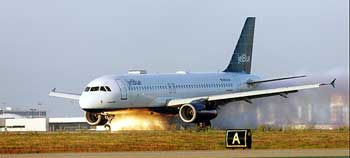
|
|||||||||||||||||||||||||||||||||||||||||||||
|
Wednesday 28 September 2005
Media
21st-Century Capitalism at the Washington Post Harold Myerson has a column on today’s Washington Post op-ed page headlined ‘Outsourcing Our Safety’. It’s based around the recent emergency landing of a JetBlue A-320 at LAX. Shortly after takeoff, it appears that the plane’s front landing gear got turned to, and locked in, a 90-degree position. With the wheels like this, the landing gear could not be retracted, nor could the plane land normally. As it happens, the plane was able to land safely in Los Angeles, as can be seen in this nifty photo from the New York Times:
Myerson uses the incident as jumping-off point to complain about corporate outsourcing and governance. He writes:
Myerson strongly implies that outsourced maintenance is a bad thing in and of itself — and, a little less strongly, that TACA’s Salvadoran mechanics are inferior to American, FAA-licensed mechanics. If this were true, we would expect two things to be true: first, TACA itself would be an accident-prone airline, and accidents would be increasing as more and more airlines outsourced their maintenance. From AirDisaster.Com, we learn that air travel is getting safer, not the other way around:
So not only have accident rates dropped steadily over the last ten years (the last time there was year-on-year increase in that rate was 1992, and the last time there was any kind of increasing trend was 1978 and 1979), but the absolute number of accidents is falling despite increases in the number of flights. And as for TACA, well, the last incident of any kind listed by AirDisaster.Com is in 1993; the last fatal accident was in 1959. So much for outsourced maintenance causing safety problems. But that doesn’t stop Myerson:
Damn that 21st-century capitalism, what with its avoidable risk! Killing all those people! If only we had a system more closely attuned to social justice, our accident rate wouldn’t be increasing! Wait a minute, our accident rate isn’t increasing; quite the opposite. Could it be that this terrible ‘capitalism’ actually results in increased safety? Possibly, but you’re not likely to read about it in the Washington Post. Air France, a state-owned carrier that certainly does not outsource its maintenance, has a fatal-accident rate of 1.19 per million flights, or a third higher than the entire world; Cubana, which is owned by the Cuban state and therefore certainly not tainted by that awful capitalism, has a rate of twenty-four fatal accidents per million flights, or over 2666% higher than the whole world. Myerson isn’t done telling us of the dangers of capitalism, though, or of embarrassing himself:
It’s idiotic to even discuss the specific companies whose names he invokes: in particular, Wal-Mart stands out in American business not only for being wildly successful, but for keeping most of its functions in-house. It owns its own distribution system, for instance, which today is true of very few companies. Myerson seems to be unwilling to understand that ‘squeezing costs’ is innovation. If you invent a machine that allows you to do twice as much work as you used to, is that ‘innovation’? Certainly. If you use that improved productivity to sell your product for less, is that ‘cost-squeezing’? Yes. ‘Cost squeezing’ without innovation means turning out an inferior product. Some companies do indeed try this, but fortunately (because of that terrible free market) those companies will tend to go out of business before long.
All of Myerson’s fallacies come together in this paragraph, and in the sentence in the last one about ‘the number of employees who benefit from the core corporation’s increased revenue [being] greatly reduced’. The CEO is supposed to be the shareholder’s man in the company. That’s his whole freaking job. The board — which is to say, in theory at least, the shareholders — hire the guy to run the company on a day-to-day basis. And in fact the problem is usually either that the CEO runs the company for his own personal benefit (buying gold-plated bathtub fixtures as business expenses, for instance), or that he is captured by the corporate bureaucracy and that he in fact does run the company for the bureaucracy’s benefit and not for the that of the shareholders. Is it really possible that a lot of the Post’s opinion pieces on business and economics are based on this kind of understanding? Maybe the Post isn’t so much a liberal paper, then, as it is a profoundly ignorant one. Posted by tino at 14:49 28.09.05This entry's TrackBack URL::
http://tinotopia.com/cgi-bin/mt3/tinotopia-tb.pl/479 Links to weblogs that reference '21st-Century Capitalism at the Washington Post' from Tinotopia. |
